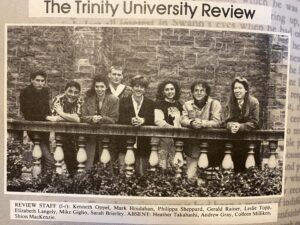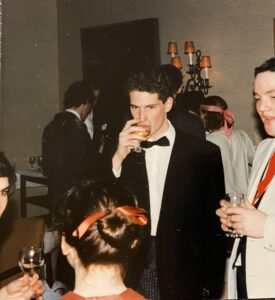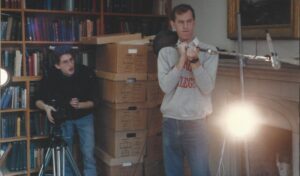
Kenneth Oppel ’89 wrote his first novel at age 14. He wrote his second novel, The Live-Forever Machine, for a creative writing course while he was studying English and Cinema Studies at Trinity College. Oppel also wrote book reviews for The Varsity, was assistant editor of The Trinity University Review, and made movies as part of the Hart House Film Club. He has written more than 35 books that have won multiple awards and have been translated into multiple languages and enjoyed by readers around the world. One of his personal favourites, The Nest, is currently being adapted into a play by another Trinity alum, Brian Quirt ’86.
The Trinity Questionnaire: inspired by Proust; tailored for Trinity
1. Why did you choose Trinity College?
My school told me to put it as my first choice. Honestly, this was pre-Internet—I lived in B.C. and I’d never been to Toronto; I’m not even sure I saw pictures of Trinity or UofT. My school told me it was the most prestigious to get into, so just do it; I was an obedient kid.
2. What is your favourite place on campus?
Philosopher’s Walk or the Trinity Quad.
3. What is your idea of perfect happiness?
Sitting in a beautiful Italian piazza with my family enjoying a good bottle of wine and talking.
4. What was the best part of living in residence when you studied at Trinity?
The sense of community, having all your friends a few doors down, the rich social life of the College virtually every day and night.
5. What advice would you give your first-year university self?
Join a few more societies, go to more events, don’t be a pretentious dick.
6. Are there any standout memories of your Trinity experience you’d like to share?
Meeting my future wife (Philippa Sheppard) on the first day of Orientation at the English Lit table in the Buttery. Being taken to the summit of the chorister’s tower for the first time (I didn’t even know it was there). Having a fireplace in my room.
7. Tell us one thing about yourself that few people know.
I stole firewood from the Provost. Once. Twice at the most.
8. Which words or phrases do you most overuse?
“but” “vast”, “terrible”, “really”
9. What is your favourite treat or indulgence?
A glass of Barolo.
10. What is your most treasured possession?
My family photo albums. Everything else is replaceable.
11. Who are your favorite writers?
Ian McEwan, Jonathan Franzen, George Elliot, Edith Wharton, Peter Carey, Donna Tartt.
12. Where do your ideas for your stories come from?
Often for me it’s settings. They spark something in me, because they’re a space that’s asking for a story to be told about it. For example, the book I wrote when I was at Trinity [The Live-Forever Machine] was inspired by me imagining what was behind the rear frosted windows of the ROM when I passed by every day on Philosopher’s Walk. I’m also fascinated by airships from the 20s and 30s. And wasp nests. And maps—I get very curious about all those places, especially the ones at the edges of the map. I have notebooks filled with ideas, and my worry now is that I’ll never have enough time to tell all the stories I want to tell.
13. Do you have a favourite place to write?
I discovered while travelling for work that I love writing on trains. So one day a month I have what I call a “train day”—I get on the train in the morning at Union Station, write all the way to Montreal, spend three hours exploring Montreal, then get back on the train and write for the five hours going home. They’re always really productive days.
14. Who is your hero of fiction?
Odd question because I like fictional characters who are brimming with personality and resolve, but they’re usually flawed and may even do questionable things. Great characters should be fascinating to watch; they’re not usually deserving of the title hero. Duddy Kravitz, Rabbit Angstrom, Lily Bart—all flawed; all fascinating.
15. Who are your heroes in real life?
There are lots of people I admire because they’re really good at a particular thing. But heroes are different. In general, my heroes are people who do something difficult or dangerous, with no promise of reward, that will benefit society. Naming heroes is fraught because it’s possible they’ll be discredited, during or after their lives, for having done something awful.
16. Can you tell us about what you’re working on now?
All I can say is it’s a story set in a very unusual zoo. More to come!




Sorry, comments are closed for this post.